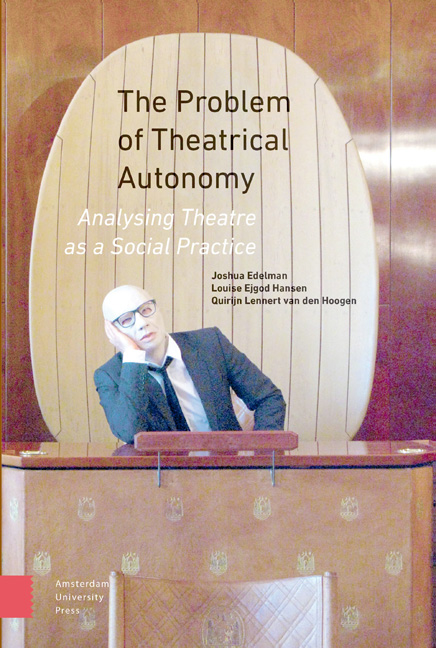Book contents
- Frontmatter
- Acknowledgements
- Contents
- List of Figures and Tables
- Introduction
- 1 How Can we Define Autonomy?
- 2 The Concept of Artistic Autonomy
- 3 Autonomy in the Contemporary Theatre
- 4 How Agents in Theatre Fields Make use of Claims to Autonomy
- 5 How Theatre Organization Shapes Claims to Autonomy
- 6 How Claims to Autonomy Serve those Outside Theatre Fields
- Conclusion
- References
- About the Authors
- Index
5 - How Theatre Organization Shapes Claims to Autonomy
Published online by Cambridge University Press: 12 February 2021
- Frontmatter
- Acknowledgements
- Contents
- List of Figures and Tables
- Introduction
- 1 How Can we Define Autonomy?
- 2 The Concept of Artistic Autonomy
- 3 Autonomy in the Contemporary Theatre
- 4 How Agents in Theatre Fields Make use of Claims to Autonomy
- 5 How Theatre Organization Shapes Claims to Autonomy
- 6 How Claims to Autonomy Serve those Outside Theatre Fields
- Conclusion
- References
- About the Authors
- Index
Summary
Now that we have discussed the concept of autonomy, the agents in and around the theatre field who make claims to it, and the reasons why they do so, we need to turn our attention to autonomy's relationship to the shape of theatre fields as a whole. The aim of this chapter is to describe the ways in which organizational forces shape and mediate autonomy in theatrical fields, and are, in turn, shaped by the autonomy they mediate. Therefore, this chapter focuses on the formal and informal structures that organize, fund and maintain theatrical infrastructure (i.e. the relationship between B and C in Figure 1). Changes in organizational features of theatre fields provide rich study material for the sociology of theatre.
In his analysis of artistic fields, Bourdieu never offered an extensive discussion of public subsidy, as he considered it to be a political force heteronomous to the field. Nonetheless, in an interview included in the Norwegian translation of Reponses. Pour une anthropologie reflexive, he suggested that other types of capital, such as political capital, might be relevant for the Nordic countries with their tradition of a strong, intervening welfare state (Bourdieu 1993e [1992], 246–247). Building on this, cultural policy researcher Per Mangset suggests that the introduction of modern cultural policy has influenced and shaped the artistic field, at least in Norway (Mangset 1998, 117–123). We have extended this idea to include other European countries with a strong cultural policy tradition. This necessitates that we address the question of how different countries’ political structures deal with the notion of autonomy of the field in both the subsidy-based funding systems and the theatrical training systems. There is no doubt that the state and its recognition play an important role in the process of claiming autonomy, but it is not always a simple one.
This is a paradox in cultural policy, which we will address continuously throughout this and the next chapter: though the political field on the one hand is obviously outside of the theatrical field and has its own valued capitals (social betterment, promotion of national or local identity or economic prosperity, for instance), it often does not intervene in the theatrical field to advance its own values directly. Rather, it does so in order to reinforce or protect the autonomous values of the theatrical field from third (social, political or economic) forces.
- Type
- Chapter
- Information
- The Problem of Theatrical AutonomyAnalysing Theatre as a Social Practice, pp. 127 - 166Publisher: Amsterdam University PressPrint publication year: 2016



